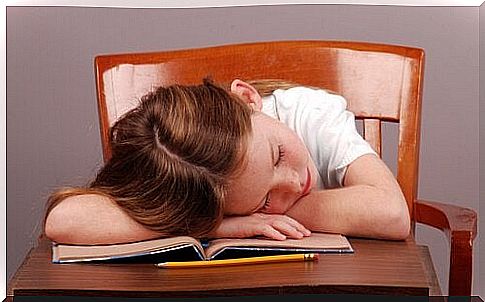Health Disorders: Children Who Go To Bed Late Are More At Risk

There is obviously a clear link between lack of sleep and various health disorders. When it comes to children, it can also cause sleep disorders. In today’s article, you’ll learn more about why children who go to bed late are more likely to experience health problems .
Routine is an important part of healthy sleep. When children go to bed late, they become used to poor sleeping habits and are more at risk of developing health problems.
Sleep deprivation has a negative impact on all of us, but at this stage of life children need more sleep than adults to replenish their energy reserves.
Sleep times by age
It is important that children require different amounts of sleep depending on their age. As we get older and mature, our need for sleep reduces from 14 to 17 hours to no more than 7 to 8 hours. For example, school-age children need an average of 10 to 12 hours of sleep.
Of course, there are certain times when these needs change. The most important thing is to respect sleep habits and lengths as much as possible.
Depending on the age of the child, they will need the following amount of sleep:
- Newborns up to 12 months: 11 to 14 hours a day are recommended.
- Up to 5 years old: Between 10 and 13 hours per night.
- 5 to 13 years old: Between 9 and 11 hours per night.
- 13 to 17 years old: Between 8 and 10 hours per night.

Why are children who go to bed late more likely to suffer from health disorders?
Many health disorders are caused by lack of sleep or poor sleep habits. Allowing children to go to bed late increases the risk that they will develop the following disorders:
- Insomnia (insomnia): If children do not develop a healthy bedtime routine, they will not internalize these important rituals and will not be able to get a good night’s sleep. As a result, having a child late to bed can lead to light sleep, frequent waking, and ultimately complete insomnia.
- Fatigue: Failure to take into account the hours of sleep needed can make a child very tired. The time to wake up may be the same during the week, but it is different on the weekend. In either case, children cannot develop a stable night and day routine because they have not been able to get enough rest.
- Apathy: Children who show apathy can behave in a similar way as if they were suffering from depression. You don’t feel like doing anything and show no interest in things. Your emotional state is characterized by constant lack of energy and leads to more isolation.
- Anxiety Disorders: The constant lack of sleep can cause a child to develop mood swings and problems with anxiety and worry. Thoughts that trigger worries and fears are retained or even increased due to lack of sleep.
Tips for going to bed
As long as normal sleep patterns are maintained, a child can be allowed to stay up late every now and then. The point is not to have strict rules without exception, but rather to be flexible when it is appropriate.

Your child should be able to identify when a situation is exceptional and when to stick to their daily schedule. Here are a few suggestions you can use when teaching your child the right sleeping habits.
Helpful habits
- A set schedule: going to bed and waking up at set times. Together with your child, you can create a timetable that you can refer to again and again.
- A relaxing atmosphere: Your child’s bedroom should be a temple of calm. Try to avoid distractions like television and video games. Your child needs a room that is only intended for sleeping.
- Prepare for bed: Before your child goes to bed, they should be in a relaxed situation. Avoid too much stimulation, such as from action or horror films, or from video games. Rather, suggest that they read something or listen to relaxing music.
- Talk to them regularly: If something is bothering your child, it won’t go away when it’s time to go to bed. Therefore, it is recommended that you talk to your child about anything that might be bothering them so that they can relax as soon as it is time for bed.
- Pay Attention to Diet: It is important to pay attention to what your child is eating. Some foods are stimulant, which can disrupt a normal sleep schedule.
In summary, you should pay as much attention to your child’s sleep routine as you do to their diet or study. In the long run, children who go to bed late suffer consequences for their mood and daily activities.









